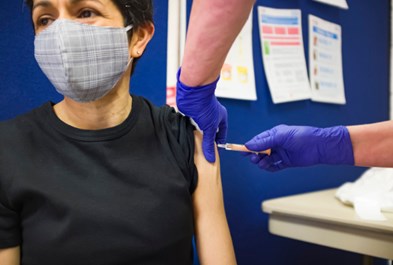Pfizer Vaccine and Immunity Boost Study
Mon, 27 September 2021

Important new paper by study author Dr Lance Turtle of HPRU-EZI who said "The good news about this vaccine is that in our laboratory based study, everyone made very good responses, no matter what the interval between doses was. At the population level, the antibody response was a bit better in those with a longer interval between doses. These findings will help, along with other real world data on vaccine effectiveness, to inform policy.”
This in-depth study into COVID-19 immune response to vaccines shows both short and long dosing schedules of the Pfizer COVID-19 vaccine generate strong antibody and T cell immune responses.
The new preprint study involving University of Liverpool researchers found that after two doses, the longer dosing interval led to higher antibody levels and a higher proportion of ‘helper’ T cells, which support immune memory and antibody response.
Importantly, worldwide studies are showing that both the short and long dosing schedules lead to strong real-world protection against COVID-19, emphasising the importance of having a second dose of the vaccine.
The Protective Immunity from T cells to COVID-19 in Health workers (Pitch) study examined how antibody and T cell levels change over time following either a ‘short’ (3–4 weeks, average of 24 days) or ‘long’ (6–14 weeks, average of 70 days) interval between the first and second dose of the Pfizer COVID-19 vaccine. Of the 503 healthcare workers recruited to the study, 223 (44%) had previously had COVID-19.
To read more:-
Payne et al. 2021. Sustained T cell immunity, protection and boosting using extended dosing intervals of BNT162b2 mRNA vaccine.
